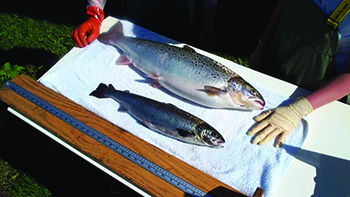It is almost axiomatic that legislation produces outcomes opposite to its stated intention. Think not? Consider the “Fisheries Conservation and Management Act.”
An AquAdvantage salmon compared to a wild salmon. If labeling guidelines stay as-is, only a QR code would be required to note the difference in supermarkets. AquaBounty Technologies photo.This phenomenon has been described by commentator Chris Matthews, among others, as “conceding on principle.” Tell the citizenry you’re giving them what they’ve asked for then give them the shaft.
Internalizing this dodge brings true enlightenment. If Congress passes “An Act to Protect Widows from Greedy Landlords,” you’ll have the spare bedroom ready when Granny arrives on your doorstep with a suitcase.
The latest example of this is the so-called GMO labeling bill, a lobby-inspired congressional effort to dupe American consumers into believing they have the right to know if what they’re eating contains or was produced using genetically modified organisms. Rather than cultivate informed consumers, the law, which trumps more progressive state legislation, promotes labeling designed to deflect efforts to learn whether a product is genetically engineered.
Go figure: Chain restaurants will soon be compelled to post calorie counts for menu items as well as “succinct statement[s] about suggested daily caloric intake,” as if there is anyone on the face of the Earth who’s unaware of the dietary implications of double-cheeseburger meals, but we can sell test-tube salmon without so much as a by-your-leave.
Not for nothing has the GMO labeling bill been dubbed “the DARK Act,” as in, “Deny Americans the right to know.” Under the legislation, which the White House has indicated the president will sign, producers of genetically engineered foods will (two years hence) be required to employ one of three labels: a symbol; a written statement noting the presence of GE ingredients; or a QR code for smartphones to scan. Call me a cynic but I’m betting most Frankenfish producers will go with the QR code.
Who cares? There are no penalties for non-compliance.
Wild salmon harvesters are not happy about the legislation. GMO salmon “poses a serious threat to the livelihoods of our fishermen,” U.S. Sen. Lisa Murkowski (R-Alaska) said prior to the vote. Her fear is that consumers will take a pass on salmon rather than risk eating what they regard as a less desirable product. “That's not something that I'm willing to take a risk, that I'm willing to take a gamble on,” she said.
There is also the issue of potential commingling of stocks.
Uproar over the bill is not limited to salmon fishermen. Consumer groups and many organic growers, among others, object to the bill, and an e-petition signed by upward of 200,000 opponents of the bill was sent to the White House Friday.
Congress is not the only place where common sense seems to have failed us. Scientists who support the DARK Act say it’s important to steer consumers away from the GMO issue.
In an op-ed piece in The Hill, David Just and Harry Kaiser of Cornell University assert that informed consumers cannot be trusted to make rational decisions about what to eat. “Mandatory labeling is not an appropriate policy response — and, indeed, can convey misinformation if interpreted as a warning.” Better, they say, to maintain “incentives for agricultural companies to invest in science and new product development.”
Just and Kaiser say they’re focused on achieving societal benefits through QR codes. “Labeling of food processes in this way can help people know more about what they eat while ensuring that conditions are ripe to help the environment and feed the poor in the generations ahead.”
Not exactly a concession of principle, but they’ve obviously learned from politicians.







